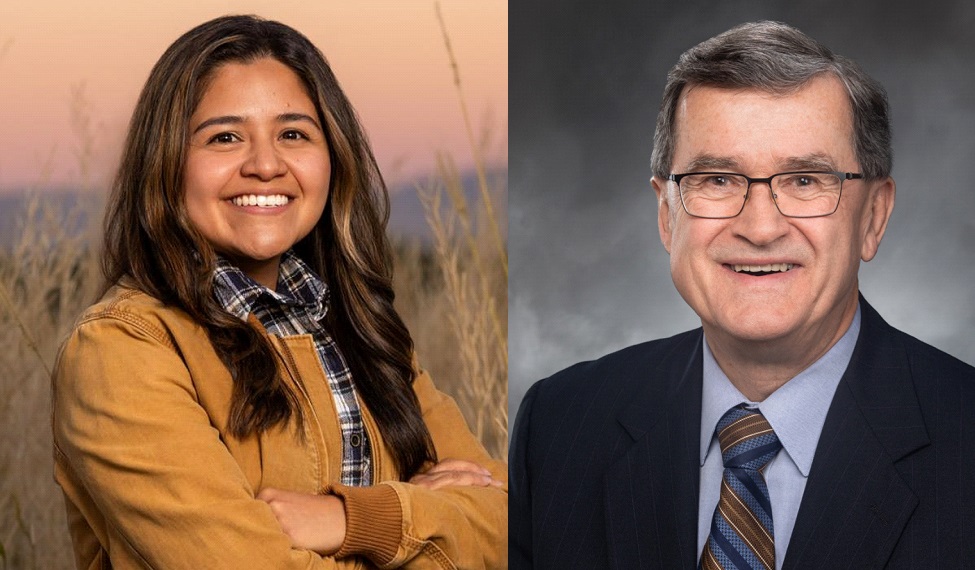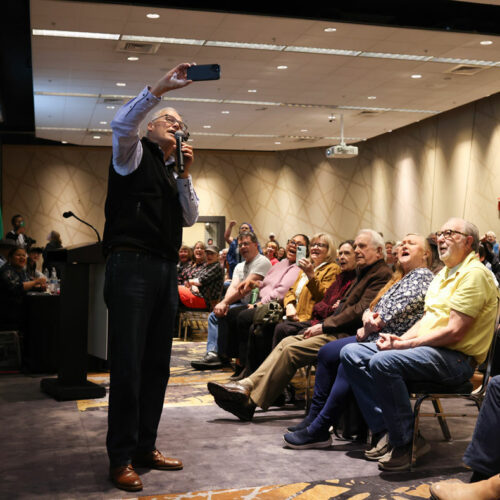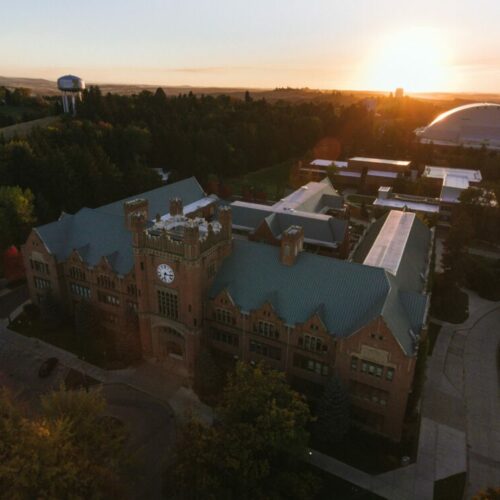
NWPB’s listeners ask, Washington state Senate candidates respond
Read
The 2024 election is underway, and the candidates’ campaigns in central Washington are moving forward.
As part of NWPB’s elections coverage, we surveyed our audience and asked them to submit questions they would like our news team to ask candidates. Here are their responses. This interview has been edited for length and clarity.
Incumbent Curtis King, a Republican, and candidate Maria Beltran, a Democrat, are running for Washington state Senate in the 14th Legislative District.
King has represented the district since 2007. Beltran is a first-time candidate.
King and Beltran were both contacted for this interview. Only Beltran accepted the interview request.
What do you propose to protect democracy further?
Maria Beltran: I’m running as a proud daughter of Mexican immigrants and farm workers, and protecting our democracy is extremely important, but it starts with us, starts with us showing up, being engaged and turning out to vote.
That’s why I’m wearing this hoodie that says ‘Go Vota.’ Because we are six days away from the election. So when I think about protecting our democracy, it starts with people like me and you showing up and being a part of it.
How will you manage policies for visiting workers?
Beltran: Immigration is a dear issue that I really care about. My parents, like a lot of folks across central Washington and across this country, came to this country in search of a better life, and have been working hard and have helped build their local economies.
In the state Legislature, I will be happy to support legislation that gives our workers protections, that allows our immigrant folks who are here contributing to our economy to also have access to health care.
A few years ago, the state Legislature allocated funding for undocumented folks to access health care, and I love that policy because I think we need to make sure that folks who have been in our country also get those benefits that they’ve all been contributing to.
A few years back, I was part of a board called … OneAmerica. OneAmerica is a nonprofit organization that focuses on protecting our immigrant and refugee communities all across the state. They protect some of the most vulnerable folks in our communities.
I look forward to going into the state Senate and advocating for our community and being a voice for folks who sometimes feel left out or even feel unseen.
Listeners asked about immigration and having enough workers to support our farmers. What are your thoughts about the relation between both issues?
Beltran: This is an issue that I’ve been hearing a lot on the doors. We have local domestic workers who are no longer getting enough hours to work throughout the season.
What I’ve heard is that they, at times, are being replaced by H-2A workers, which is the type of visa that the workers have to obtain in order to come to our country to work during the seasonal harvest time of the year.
Locally, I’ve heard that people, local farmworkers, are not getting more than 30 or 40 hours a week and that some of that work they used to do and they want to keep doing is being supplemented by H-2A workers.
I think first and foremost, we have to make sure that we are prioritizing our local workers and making sure that we’re properly compensating them, that they are being treated properly with respect and dignity. And during the hot summers, we got to make sure that we’re looking out for farmers and our growers because it gets really hot here in central Washington. For me, it’s always making sure that we’re prioritizing our local workers.
I understand that the industry is facing a lot of challenges when it comes to overtime and workforce. … I think agriculture has been the strongest economic industry we have had in central Washington. I want to make sure we’re working together to keep our farmland farming and to keep our workers working locally.
Do you support health care for women, including abortion access?
Beltran: I support health care for everyone. I think health care is a human right. I also support protecting people’s access to reproductive health care.
I think that the government and politicians should not get in between a woman and her doctor when it comes to making personal decisions.
I really, really respect the autonomy as us women, to be able to make our own decisions about our bodies, so no one else should be making those decisions for us.
What are your plans to protect Pacific Northwest natural resources while balancing business and population pressures?
Beltran: That’s a great question because we’re seeing it all across the state, but specifically how this is translated in our region. Going back to agriculture, farmers and growers, we’re seeing that a lot of them are starting to age out from being able to farm and take over the land.
Right now, farmers and growers are having to sell their property to either someone who wants to take over and continue farming. Or the other option is selling it to development because we’re in a housing shortage, so people want to build more houses. For me, going back to Ag, I want to make sure that we are protecting our farmland because once farmland is gone, it’s gone forever.
It’s making sure we’re protecting our farmland, but that we’re also being really thoughtful about how we’re building. We have a housing shortage that’s driving up the cost of rent, house mortgages. We have to balance out all these priorities.
When it comes to protecting our natural resources, they’re sacred. We have the Yakima Reservation in District 14. I want to make sure that we are protecting their natural resources and their sovereign treaty rights.
The way I think about it is: I want to work with all of our tribes, I want to work with the new head of the DNR department, I want to work with our foresters and our agriculture industries and community members, because, at the end of the day, we’ll be the ones impacted by these decisions. I think of myself as more of a cooperative, wanting to have a holistic and well-balanced approach.
What are your thoughts about nuclear energy and energy alternatives to dams?
Beltran: I think right now, in Tri-Cities, we’re seeing major investments in clean energy. I think right now, we are sort of leading all those efforts. I think I want to see how our current plans are working and seeing alternatives in the future.
How will you work across the aisle to solve the very real problems we face: climate change, income inequality and racism?
Beltran: These … issues (are) extremely important, and we need to address. I approach this through a collaborative approach, is the way I’ve been campaigning. I have been campaigning for the last nine months, and I’m going out, knocking on doors, door to door. … I’m talking to everybody across political spectrums, across ethnicities, and most importantly, across the entire district.
The way I think about my leadership style is I’m going to show up, I’m going to listen, and I’m going to get to work. That means working with my colleagues across the aisle.
If elected in November, … I want to make sure that I’m working with them closely and I’m hearing their perspective and taking all of it into consideration because no party, no individual person, has a monopoly on good ideas.
I look forward to bringing this fresh new perspective and new energy to this position and bringing back the resources we need to address some of our most pressing issues.
What plans do you have to protect the electorate from disinformation?
Beltran: We’re seeing some of that play out in my race where my opponent and the supporters are sharing lies about or spreading lies about my positions, even though I’ve been pretty clear publicly on where I stand.
First and foremost, it’s a shame that people are willing to lie to try to win an election. I think what we need to do is our part as voters.
What we’re trying to do in order to be able to address and engage members of the community is we need to show up to events, forums and ask people questions on where they are on issues. It starts with us. We are going to show up, we are going to participate.
It also starts with us doing research. Trying to understand where this information is coming from, who’s putting this information forward and how is the information being shared?
I think the other component, as individual folks as us, but then as candidates and as people who are in elected positions, our role is to show up, to listen and to participate in interviews like these, to share where we are in issues.
It’s like a two-way street as individuals, and then as candidates and elected officials to make sure we’re available in answering these questions.
Do you trust election integrity, and will you concede if you lose?
Beltran: Absolutely. I trust the electoral process. I trust our election officers. The folks that are working are some of the hardest-working folks.
So absolutely, I trust our system and I will accept the election results.















